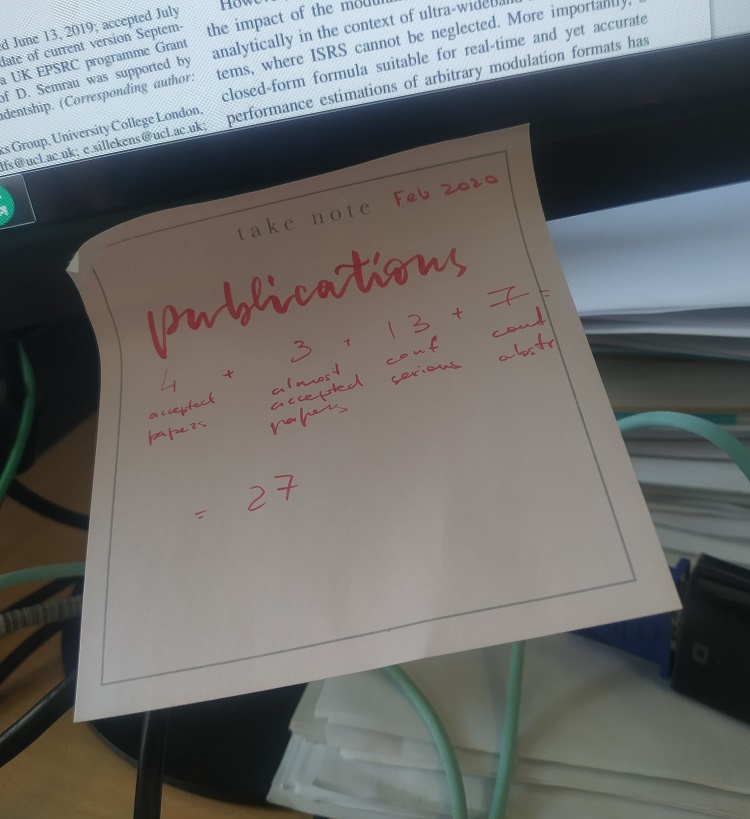Anastasiia Vasylchenkova on finishing her PhD
Anastasiia Vasylchenkova submitted her thesis in February this year and successfully passed her viva in April. Here, she shares what that process was like during a global pandemic and remembers her favourite moments from PhD life.
This post is part of a series we are running throughout December highlighting the success and resilience of our research students despite the enormous challenges of 2020.
How was the writing-up process for you? 
Completing a thesis is a complex and difficult job. It takes all of your time, concentration, skills and abilities. A month before my submission I still had visiting collaborators, needing my attention, papers to finish, and reviewers' corrections to respond to. Two weeks before submitting I was doubting the very purpose of thesis submission, and then I had to overcome yet another challenge: to complete and submit a project for an individual fellowship with exactly the same deadline! Thesis writing was the most painful part of my PhD experience – I empathise with anyone currently going through it.
Did the pandemic impact your viva examination?
I arranged my viva at the beginning of March, when all the Covid-19 limitations were beginning to take hold across Europe. It was extremely challenging to do this in a timely fashion in order to give my examiners sufficient time to familiarise themselves with the content of my thesis. The communication between all involved parties was so inefficient and distracted, and it led to a change of external examiner at short-notice.
How did you celebrate passing your viva?
It was during lockdown when we were only allowed outside once a day to walk or exercise. Fortunately, my colleagues and I had made evening video calls routine by this point, so that evening the call was to celebrate my viva success, and everyone was calling me Dr.
Do you have a top tip for a successful online viva?
I found a video call-based viva quite enjoyable and nice. You do everything for the comfort of your own home, no need to travel, there are not distractions from an office environment. The most complicated part was when, two days before my viva, the examiners decided to change platform from Zoom to MS Teams and accidentally did not inform me! It was excusable and funny looking back, but I did not like this last-minute alternation at the time.
What’s been your favourite moment or experience from PhD life and why?
After several years of being a part of the team, my confidence and independence have really grown, and I’ve developed firm connections with colleagues. We’ve had infinite deep conversations, full of insight and deep understanding of the challenges we face at different career levels. Last year I organised the Institute Christmas party, and everyone agreed that it was one of their best experiences whilst working there. The acknowledgement section in my thesis is over a page, and full of gratitude towards my colleagues.
What’s your advice for new students joining the team and why?
You should consider the authority of your supervisors and more senior colleagues in light of their own career journey, expertise, responsibilities and priorities. No-one knows everything about the physics behind your problem, or all details of equipment or simulation operations, so no-one can give you 100% certain answers to your questions, however confident they may look. Also, consider that your current career goal is to quickly gain sufficient lab and research skills, and some publications. So, try avoiding abandoned topics or over fundamental topics.
Anastasiia was awarded her PhD from Aston University in June. Her thesis title is 'Nonlinear Fourier Transform In Application To Long-Haul Optical Communications' and was supervised by TRANSNET Co-I Professor Sergei Turitsyn.
And remember that fellowship application? Well, it was successful. Anastasiia was awarded a Leverhulme Trust Early Career Fellowship in June which she began in October, moving from the Aston Institute of Photonic Technologies to join the Optical Networks Group at UCL. She has been a member of TRANSNET since 2018.